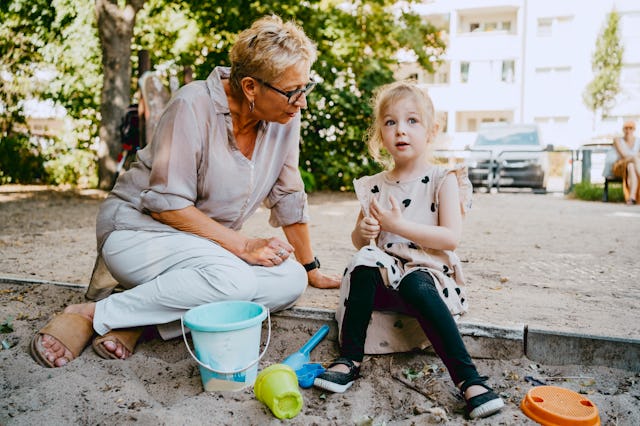My Young Child Doesn't Have A Boyfriend Yet. Stop Asking.
Just cause she's "gonna be a heartbreaker" doesn't mean she needs to be asked this.

Since my oldest daughter was 3 or 4, I’ve gotten comments from adults — family members and others — like “You’re going to have to beat the boys away with a stick” and “I hope her father knows how to shoot.” As she got older, the comments changed to one question in particular: “Do you have a boyfriend yet?” Initially, I brushed it off because it seemed ridiculous. My daughter couldn’t even spell “boyfriend.” But it still bothered me. By my third daughter, I’d had enough and started to respond with comments like, “We’re just working on pooping in the potty right now.”
I’ve been told I’m overreacting. I’ve been told these comments are relics of the “old days” and an attempt for older people to connect to younger generations. That may be so, but that doesn’t mean we should shrug our shoulders and allow it to continue. These comments are rude, inappropriate, and creepy, and they actually send children coded messages of heteronormative expectations and victim shaming, and it needs to stop. Now.
To me, these questions suggest to children that finding a partner should be their goal. As children grow older they start to think there is something “wrong” with them if no one is romantically interested in them yet. My 11-year-old daughter recently told me she is “invisible” to boys, and I wanted to tell her she doesn’t need those kinds of distractions, but I understood that she might be feeling she isn’t feel pretty or interesting enough for someone to have a crush on her. No one, at any age, should feel “less than” if they aren’t in a partnership. It isn’t for everyone and it doesn’t equal happiness of fulfillment.
It also suggests the ideal relationship — the default — is between a man and a woman, while also assuming that gender is binary. Why assume that it’s a boyfriend my daughter would want? It’s part of the same set of cultural messages as the time somebody told my son, after his sisters painted his nails, that only girls wear nail polish. Those messages say girls are one thing, and boys are another, and they date each other and only each other. When gender and sexuality are so much richer and more complicated than that.
And it devalues platonic friendships, too, suggesting that romantic relationships are what matters. It’s hard enough for kids to find real, authentic, safe friendships without sidelining them.
As my children have grown up and as I’ve grown as a parent, I’ve become more vocal about responding to inappropriate comments when they are made, but, more importantly, I’ve taught my children to do the same. I’ve taught them about respecting themselves and others and that love looks different for everyone, so I was proud when someone recently asked my 11-year-old daughter if she had a boyfriend yet, and she responded with, “Why didn’t you ask if I had a girlfriend?” Then, after a slight pause, she continued, “Besides, I don’t have time for anything like that. I want to be an Olympic swimmer one day and a published author.” Yes! I wanted to shout.
You may still think I’m overreacting, but can we at least agree that there are better ways to connect to young children? Ask them what subject they like best in school, or what their teacher’s name is, or who their best friend is. Ask about the sports they play, or songs they listen to, or the TV shows they watch. Or, here’s another idea, don’t say anything at all.
Jill Bodach is a former journalist who spent ten years covering the police beat for a daily newspaper in Connecticut. While she liked the excitement and busyness of the newsroom, she decided to try something new and went to graduate school where she received a MS in English. For the past 16 years, Jill has taught college writing, literature and creative writing courses.